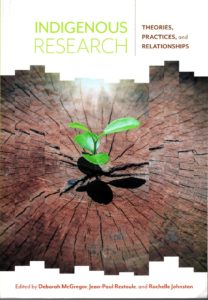Book review: Indigenous Research: Theories, Practices, and Relationships
Indigenous Research: Theories, Practices, and Relationships, is a great recent contribution to understanding, elaborating, and developing Indigenous research methodologies. It is an edited collection containing 17 chapters devoted to exploring how different scholars approach research from a basis of respect, responsibility, reciprocity, and relevance which are tied together by relationships.
While each chapter’s author approaches Indigenous research methods differently, all are bound by and through efforts to effectively work with Indigenous communities and peoples to forward our peoples’ well-being.
Additionally, while the majority of the volume’s contributors are Indigenous, a few non-Indigenous people contribute discussions about their efforts to work within an Indigenous methodological framework. These efforts speak to the idea that Indigenous methodologies, when applied in respectful conjunction with Indigenous communities, can be utilized by non-Indigenous peoples seeking to develop new and better understandings of the world. After all, when properly applied, our methodologies offer a different vision of the world that everyone can benefit from.
Of particular interest are the chapters that explore research methods and building relationships from Anishinaabeg perspectives – specifically chapters 2, 7-10, and 12-14. For example, Nicole Bell’s chapter discusses in a near-linear manner how Nanaboozhoo, the bundle bag, and the medicine wheel have worked as core values within her work. Likewise, Deborah McGregor’s chapter talks about how research is about “reclaiming our stories and knowledge through personal transformation while in the pursuit of knowledge”. She also discusses that for her, research is also about storytelling. Regardless of whether it is in written or oral forms, the process of research, acquisition of knowledge, as well as personal understanding and growth form part of the story that we share with a variety of audiences. McGregor notes that it is important for us as Anishinaabeg and Indigenous researchers to always acknowledge “those who have shaped and contributed to our knowledge” regardless of whether or not those sources and sources of knowledge are academic. These are two examples of a diverse collection of materials united in their efforts to share experiences and understandings of what makes Indigenous research and how it is applied within their work.
While this volume is aimed at a scholarly market, it is truly a must-read for community members. The writing styles of each author, influenced by their Indigenous experiences and research, tell a variety of stories in an incredibly accessible manner. Since it is aimed primarily at students, each chapter or section comes with a series of questions to aid in or develop further conversations surrounding Indigenous or Anishinaabeg research methodologies.
Deborah McGregor, Jean-Paul Restoule, and Rochelle Johnston, eds. Indigenous Research: Theories, Practices, and Relationships. Toronto: Canadian Scholars, 2018.



